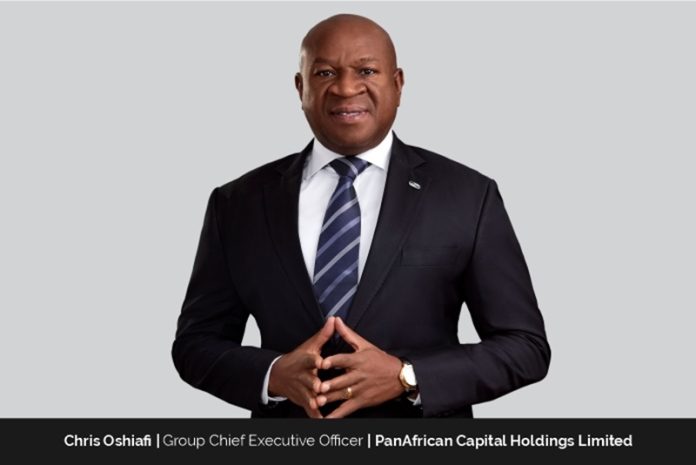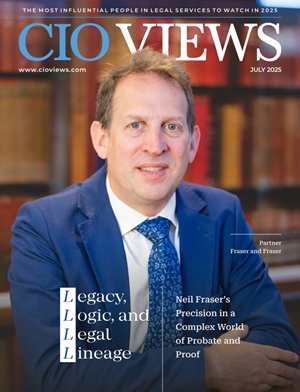
In the world of finance and entrepreneurship, few journeys are as inspiring as that of Chris Oshiafi, the Group Chief Executive Officer of PanAfrican Capital Holdings Limited. From a young boy fascinated by a banker’s appearance to the helm of a pioneering proprietary investment company, Chris’s story is one of passion, relentless determination, visionary leadership, and strategic planning. He is not only focused on his organization’s growth and success but also interested in reshaping the narrative of Africa.
Throughout his career, Chris has strived for excellence, learned from his failures, nurtured relationships, and embraced challenges as opportunities for growth. What sets him apart from other people in the financial landscape is his ability to see what others fail to see. He is a visionary in every sense of the word.
The Professional Journey
Chris’s foray into the financial services industry was not an unplanned move. He had nurtured the dream to work in this space since a young age. As a very young boy, he was fascinated by the sight of a man wearing a white shirt and nice suit, who he would see daily while hawking newspapers on the streets. One day, he mustered up the courage to ask him, “What do you do?” The man told him that he was a banker and worked in a bank. “I just said in my head, ‘What does it take to do that?’,” Chris recalls.
Initially, in elementary school, Chris struggled with mathematics. Aware that a strong knowledge of numbers was essential to becoming a banker, he embraced the challenge to become better in the subject. “Everything changed from that time onwards,” Chris says.
He began his impressive career journey over 30 years ago, in 1988, as an insurance advisor in a multinational insurance company. He then transitioned into the role of venture capital advisor; he not only offered advisory services but also set up several venture capital companies. Chris has also worked in investment banking, and he has treasury experience as well. In 2006, he brought together a couple of people to establish PanAfrican Capital Holdings.
“In 2006, an opportunity came where we had to put together a team to make an acquisitional start of PanAfrican Capital Holdings,” Chris says. This not only marked the inception of the company but also the beginning of his journey as a leader.
Following his leap of faith, Chris began to recognize that there were people who were interested in gaining from his guidance, seeking his mentorship, and placing their trust in him. He recognized his responsibility toward others, which made him committed to becoming a true leader.
Evolution of PanAfrican Capital Holdings
Across Africa, PanAfrican Capital Holdings is a proprietary investment company with special focus on key sectors across emerging and frontier markets in Africa. These sectors cut across financial services, hospitality and entertainment, real estate and infrastructure, agro-allied and FMCG, healthcare, renewable energy, and technology and payments. When Chris and his team founded the company, its primary focus was on the financial services industry. At the time, they also devised a strategic 5-year strategic plan that was supposed to culminate in 2010. “Little did we know, two years down the line, there would be a global economic crisis,” Chris says.
The 2008 global financial crisis “tore to shreds” everything they had planned to achieve. Chris and his team initially wanted to consolidate on all aspects of investment banking, asset management, and securities trading, but they had to return to the drawing board because of the crisis.
Chris points out that they started as a monosectorial company, focused on dealing with financial services, but the challenges that they faced in 2008 highlighted to them the need for diversification. So, in their subsequent 5-year strategic plan, they expanded their focus, diversifying into other growth sectors. They decided to analyze the global economy, the African context, and the Nigerian economy, in addition to determining the sectors that would be attuned to human living, sectors with consistent demands, and sectors capable of meeting the supply needs.
“Commencing our journey within the financial services sector, we have successfully carved out a distinct niche for ourselves. Over time, our organizational scope has expanded significantly, encompassing operations in six additional sectors. These sectors include Hospitality & Entertainment, Healthcare, Real Estate & Infrastructure, Renewable Energy, Agro-allied & FMCG, and Technology & Payments. This diversification reflects our commitment to multifaceted growth and positions us as a dynamic and versatile entity in various industry domains,” Chris says. “I’m proud of what my colleagues and I have done to grow these sectors into about 14 subsidiaries.”
Responsibilities of a CEO and Typical Day
Chris defines his CEO role as multi-dimensional. He works long hours so his focus after he wakes up is on organizing himself, and his work hours are filled with meetings and interactions with clients, regulators, employees, and the wider society.
Chris steers the company’s strategic direction and focuses on its growth and performance. He oversees all aspects of business operations, business development, risk management, financial performance, and most importantly, talent development. “So, on a typical day, I probably engage in various activities, such as meetings with stakeholders, strategic planning sessions with senior management, planning key performance indicators, and monitoring market trends,” he shares. A lot of Chris’s time is also devoted to mentorship and leadership development initiatives, and he makes sure to stay abreast of industry development as the industry is changing rapidly.
Chris’s work involves focusing on the vision and ensuring that they are adhering to the organization’s mission, upholding their values, and maintaining their corporate ethos. “I ensure that we don’t lose focus on them, even when dealing with daily challenges,” points out Chris.
Despite a demanding work schedule, Chris prioritizes work-life balance. He firmly believes that it is essential for one’s well-being and effectiveness as a leader. He strives to achieve that by practicing self-care, spending time with loved ones, exercising, and indulging in mindfulness activities, which keep him grounded and resilient in spite of the demands of the job.
Chris is also able to maintain a work-life balance because of the supportive and inclusive environment he has created at work, which allows every individual to feel valued, recognized, and empowered to succeed. He leads by example as well, demonstrating a strong work ethic, which permeates throughout the organization. Chris explains that when employees imbibe this ethic, it becomes the workplace culture, encouraging them to do what they are supposed to do. “You do not have to oversee them as they understand the mission and the vision, and then, there is also open communication, collaboration, and continuous learning,” he adds.
Additionally, the company organizes regular knowledge-sharing sessions, which allow people to exchange their knowledge. All these make it easier for Chris to take time off when needed and balance his personal and professional life.
One-on-One Approach
Chris is an alumnus of Harvard Business School. When he was a student there, one of the things that kept him up in the class most of the time was: how to retain young people working in the organization. He noted a pattern: young people working for a year or two after finishing school and then quitting to move abroad. “It was frustrating to see that,” Chris reveals. They had made significant investments in these people, and when they departed, they had to return to the drawing board and start the same process again. It increased the training cost as well.
Looking for a solution, Chris approached one of his professors in Boston. When he told him that for him and his organization, it was a challenge to retain young people, the professor suggested that he engage not just with direct reports but also with those who are one level below or two levels below. Chris returned from the U.S. and adopted a one-on-one project, encouraging open communication and personal engagement. He invited his employees – two levels and three levels below him – to his office for informal talks over coffee and showed interest in knowing about them and their aspirations, not what they did. “I also told them, ‘Trust me, whatever we discussed here, it will stay here. I’m not going to discuss it with your line manager, and even if I did, I’m not going to mention names’,” Chris shares.
“When you have such open communication, and people know that their inputs are valued, they want to stay more in the organization,” he adds. “They are also fired up.” Over time, Chris’s one-on-one approach has helped him shape what keeps everyone motivated to keep working in the organization.
The Future Plans
Africa is currently home to 1.4 billion people. By 2050, one in four people on the planet is expected to be African – that is a “humongous” number, Chris says. Boasting a substantial population, the continent grapples with a multitude of issues and obstacles, including youth unemployment, subpar agricultural output, deficient political governance, feeble institutions, escalating criminal activities among the youth, and the looming specter of climate change. Nevertheless, as highlighted by Chris, Africa possesses abundant natural and human resources, including diamonds, sugar, salt, gold, iron, cobalt, uranium, copper, bauxite, silver, petroleum, and cocoa beans. Additionally, it boasts a reservoir of talent, particularly in music, visual arts, and culture.
Despite being abundant in natural resources, the continent does not economically benefit from it. For example, Africa produces 80% of the world’s cocoa, but its share in the global chocolate industry, which is worth over $12 billion, is minimal. Africa only receives 10% of this industry’s value, which is $1.2 billion, due to lack of infrastructure and price-setting power, Chris highlights. The West determines the price as they are the producer of chocolates.
Chris stresses the need to change the narrative to enable some level of chocolate production in Africa, allowing them to tap into the high-value chocolate market. “The goal of PanAfrican Capital is to ensure the requisite finances and human resources that will create additional resource value,” he says. “So, a part of the $12 billion industry is tapped and kept in Africa, that will help deal with the problem of youth employment, drought, and governance issues.”
Africa also does not gain from its crude oil as it is not a producer of petroleum products. When the countries in Africa import petroleum products, they end up wasting all the gains they made from selling crude oil, Chris points out.
PanAfrican Capital wants to change the narrative about Africa – from being a provider of natural resources to being a producer of products. It wants to spread a positive and consistent message across the West of Africa to the East of Africa, and North of Africa to Central Africa. “We don’t want to sell a message where Africa is seen as a destination of military coups,” Chris says.
He also says that they want to attract substantial capital to the continent, which can help them deal with infrastructure and equipment problems. “It can help us become a more productive economy and continent. That is why PanAfrican Capital Holdings is supporting the AfCFTA (African Continental Free Trade Area). With Africa as a single market, there would be the free movement of labor and reduced dependency on the US dollar as a means of payment ” he adds. Once it is successful, it is expected to become the single largest trade block in the world.
Under Chris’s leadership, the company is also supporting a currency that is tradeable within the African borders – to reduce dependence on the U.S. dollar or Euros. It will enable exporters and importers to trade within Africa easily. Chris says, “I want the company to push the frontiers and Africa-based institutions and see how we can grow the continent and make it richer.”
‘Thank You’ Notes
Throughout his career, Chris has received numerous rewards and accolades. However, his greatest achievements are the “Thank You” notes that he regularly receives from his colleagues, mentees, and those for whom he created opportunities. “I’ve watched people grow,” he says. For example, Chris stepped down from the position of CEO of an investment bank to embark on his PanAfrican Capital journey, and today, there is a fourth successor who is leading that financial institution.
Chris has also been recognized for his contributions to advancing diversity, equity, and inclusion in the workplace. He has enabled a paradigm shift in thinking; for example, creating a culture and environment at work that allows women to move beyond roles reserved for them and do incredible things. He feels good about himself when people talk about his contributions that led to the shift.
Message to the New Generation
When he was working as a newspaper boy, Chris made sure that he was the newspaper supplier of the man who sparked his interest in the finance industry. “I made sure that I took the newspaper to him rather than him coming to me to buy it. He gave me an insight into what the banking world was like, how it was structured, the way they do it, and the spaces and air conditioning,” he says. The information provided by the man blew him away, and at the time, he decided that he wanted to be like him when he grew older. With the revolutionary strides in technology, accessibility to vast information, and the availability of superior facilities, the next generation of leaders can navigate a landscape where digital advancements and instant connectivity have obliterated barriers to knowledge. Chris says “It is because the ubiquity of the internet empowers them to access a wealth of information at their fingertips, facilitating informed decision-making. They benefit from cutting-edge tools and resources, fostering efficiency, collaboration, and innovation.”
Chris met the man when there was no internet. Now, with the internet, everyone has massive amounts of information at their disposal. So, when someone tells the new generation about something, they can verify the information in 2 minutes. So, in the internet and information age, Chris’s message to the next generation is, “Focus on what you intend to do, and you should be very clear about it. There should be continuous learning for growth. You should also choose to make a positive impact on the world around you.”
According to Chris, the new generation of leaders is primarily focused on self. He advises them to dream big. Whatever they do, it should not just be about themselves. “It should be about the environment and the next person, and you should stay true to the values that they have,” he says.
Also, he points out that the new generation must not underestimate the power of perseverance, resilience, and determination, and he encourages them to embrace challenges, learn to handle stress, and never quit believing in themselves.
“Leadership is not about titles or accolades but it is about the positive impact you have on the lives of others and the legacy that you leave behind,” Chris tells the new generation of leaders.
What is Success?
Chris’s definition of success is deeply introspective and philosophical. He sees it as a journey and not a destination. “Success is not final and failure is not fatal,” he says. “It’s the courage to continue that count.” For him, the highest point of his career is an ongoing, holistic sense of fulfillment – not achieving financial-milestones. “True success is when one feels a sense of fulfillment, which comes from positively impacting people’s lives and meaningfully contributing to the community and society at large,” he says.




















